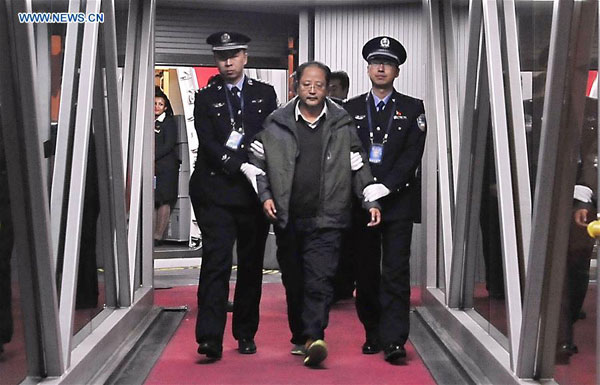Last year, the national prosecuting departments stepped up the fight against corrupt high-ranking officials and investigated 41 officials of the ministerial-level or above for alleged graft, according to an annual work report of the Supreme People's Procuratorate (SPP).
|
 |
|
File photo of Pei Jianqiang, one of China's most wanted economic fugutives, is escorted by policemen at Capital International Airport in Beijing, capital of China, Jan. 1, 2016. Fleeing abroad in 2009, the 48-year-old former manager of China International Enterprises Cooperative's import and export department is one of the 100 economic suspects on a list wanted worldwide by the Interpol's National Central Bureau of China. [Photo/Xinhua] |
The 2015 figure marked a remarkable increase of 46 percent over the previous year, when 28 such officials were investigated, according to the SPP.
Senior officials probed included Ling Jihua, former head of the United Front Work Department of the Communist Party of China (CPC) Central Committee; Su Rong, former vice-chairman of the top political advisory body and Bai Enpei, former Party chief of Southwest China's Yunnan province.
The report said prosecutors nationwide have a firm resolution in fighting corruption and focused on major and serious corrupt cases involving high-ranking officials.
Since November 2012, when the new CPC leadership took office, anti-corruption has become one of the top priorities. President Xi Jinping has conducted a sweeping drive to fight corruption among both "tigers" - high-ranking officials, and "flies" - low-level officials.
Apart from targeting those who took bribes, prosecutors nationwide last year also investigated 8,217 people accused of offering bribes to officials to gain benefits, a year-on-year increase of 5 percent, according to the work report.
This year, prosecutors will pay more attention to corrupt officials who hinder the implementation of major national economic development strategy or reform measures, and those who endanger governmental investment and the safety of State-owned assets, the report said.
Moreover, they will also be more aggressive in going after the "flies" from the grass-roots, and corrupt officers in charge of agriculture and poverty alleviation.